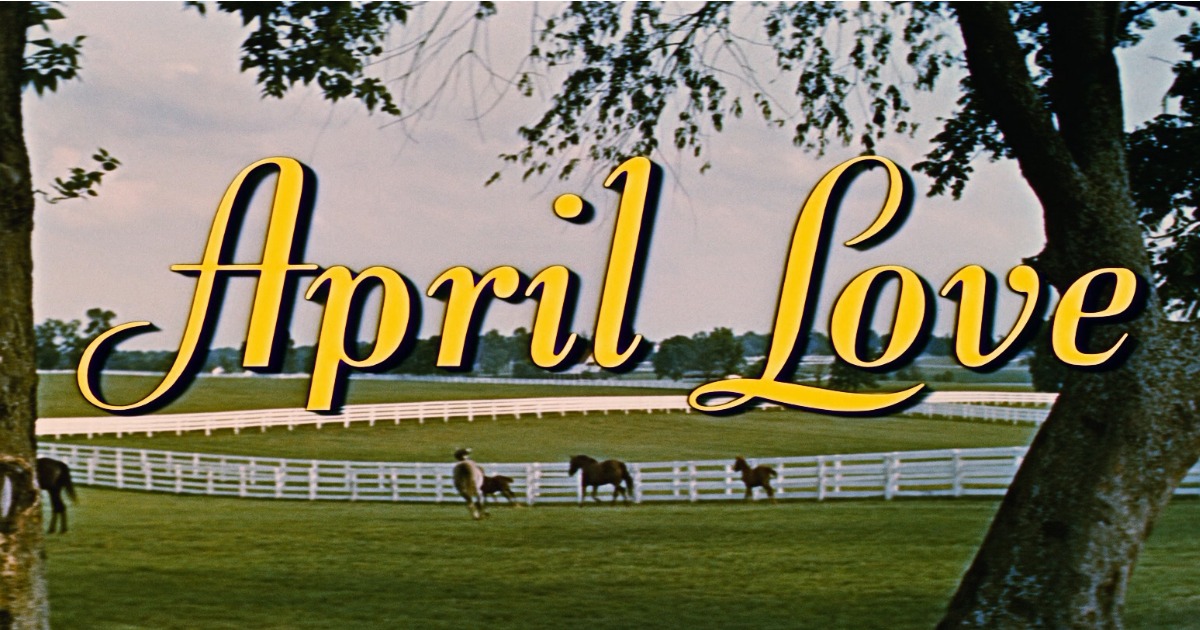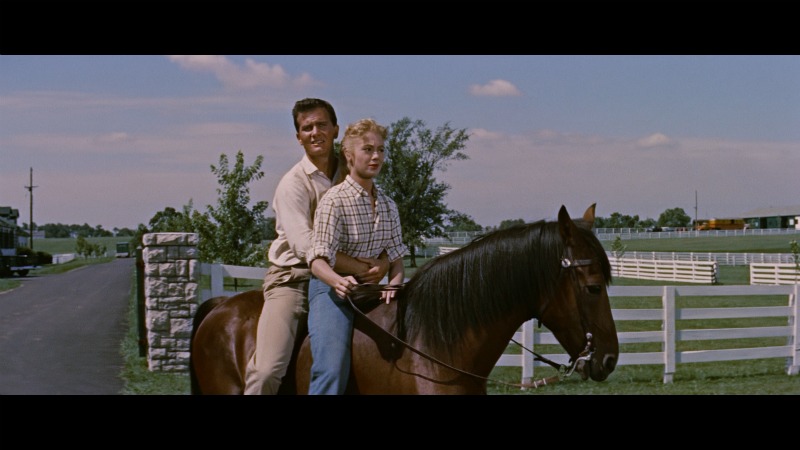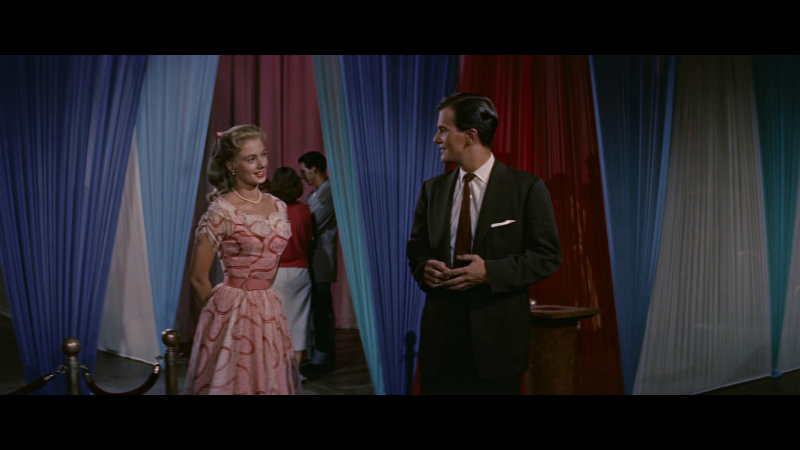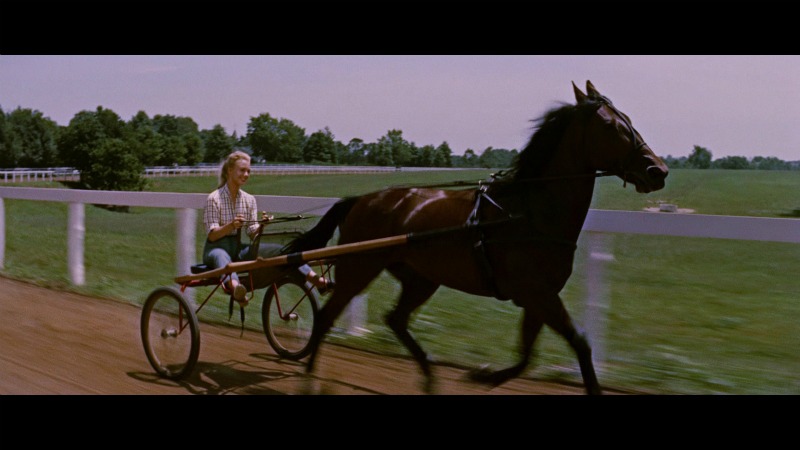
Like most home video geeks, I have my share of frustrations with Twilight Time – their high prices, their retailer exclusivity (better enjoy tacking on $5 for shipping to buy from Screen Archives!), their limited runs that often sell out quite quickly. But while most labels are doubling down on their bro cred with an endless supply of horror, sci-fi, action, various forms of -sploitation, and Empire-Magazine-approved auteurs, Twilight Time has shown remarkable commitment to melodramas, musicals, date movies, and other genres deemed too “girly” for most boys to ever consider watching, let alone buying at such a high price point.
What other outfit has the balls to put out such films as Bye Bye Birdie, Picnic, Cover Girl, Bell Book and Candle, Steel Magnolias, or Bonjour Tristesse? Add April Love to the roster. It’s a 1957 musical about too-cool-for-school Nick Conover (Pat Boone) getting sent from Chicago to live on his aunt and uncle’s farm, and falling in love with the sweet girl next door (Shirley Jones), all while learning to tame and race a horse. It’s widescreen and colorful and Boone never kisses Jones out of consideration for his real-life wife and it has a whole routine where Jones, Boone, and two costars sing about what fun a barbecue is and damn if it isn’t all pretty charming.

Pat Boone does not make for a terribly convincing juvenile delinquent. It’s not simply a matter of popular association. His attempts to feign disinterest in the horses, and passion for cars, never quite carries. He’s standoffish towards his uncle (Arthur O’Connell), but never cruel, never disobedient, never wild. His performance works best in the rare moments when actor and character collide, chiefly in trying to learn to race a horse by harness. Even those who love animals won’t necessarily jump at the chance to be dragged by one, and by actually getting in the sulky and actually riding at a pretty good clip, the natural blend of exhilaration and fear is right there on his face.
It also helps to see him through the eyes of the woman who loves him. Jones, coded as something of a tomboy (she wears a ponytail! And flannel!), seems to put an awful lot of work into being such. Even when Liz is dirty, she’s a pretty sort of dirty. But her make-up is carefully applied, her hair the beautiful sort of bouncy that doesn’t exactly come from hours of sweating on the track (she, too, is an ace jockey). Her love for Nick is so reflexive, she can’t even properly make him jealous without running a few moments later to admit her ruse. In the film’s one scene to acknowledge the existence of sex, she undresses (behind a series of obscuring objects) to shower, gazing off into the distance in almost a trance, singing her hope to be the sort of woman Nick could love. It’s a little creepy, but it’s also kind of sweet.

Like any truly worthwhile film, the outer conflicts pale against the inner; unlike a great film, however, the outer conflicts barely register. Nick and his uncle don’t see eye-to-eye, but they will. Nick gets behind the wheel of a car when he shouldn’t, but nothing bad happens. Nick’s a bit more stuck on Liz’s sister (Dolores Michaels) at first, but he’ll come around. We should be so lucky to get so many breezy, pleasant films about people who at least try to treat one another decently. Even the Law, when it rears its head, cannot topple their decency.
It’s all a bit fantastic, but if there’s any form of fantasy worth indulging, it’s those that suggest we try our best to be our best. It dodges a few potential traps – Uncle Jed comes off as a bit of a religious zealot at first, but religion is never brought up as the answer; in fact, the boy who doesn’t pray before dinner is the more reasonable and kind of the two – and rises to the occasion in acknowledging that not everyone is enjoying the postwar prosperity Liz and Fran do. Its class consciousness may be a little pat – it’s just a matter of hard work and determination! – but it’s better than none at all.
The songs are mostly winning and spirited, without being terribly memorable.

Twilight Time’s transfer on their new Blu-ray edition looks a bit like what it is – a master provided by a studio from which they’ve wrung as much as they could, but is still sadly limited. It’s plenty sharp, clear, and colorful; even depth is fairly well-represented. But it’s too overscrubbed of grain; there’s hardly any texture to the thing at all. Every surface is gleaming and smooth and inhuman. There’s no damage, no flickering, no life to it at all.
Twilight Time has been gradually stepping up their supplement game, and in addition to the usual passionately-argued liner notes from Julie Kirgo, we get a very good commentary track with Jones and film historian Nick Redman. Jones is, naturally, very complimentary towards her collaborators, but Redman asks the right questions to get into the process of making the film, as well as providing an overview of her storied career.
The overall package might be a little on the slight side for the hefty fee Twilight Time charges. For those of us starved of these sort of films on Blu-ray, though, it’s a very welcome reprieve.


